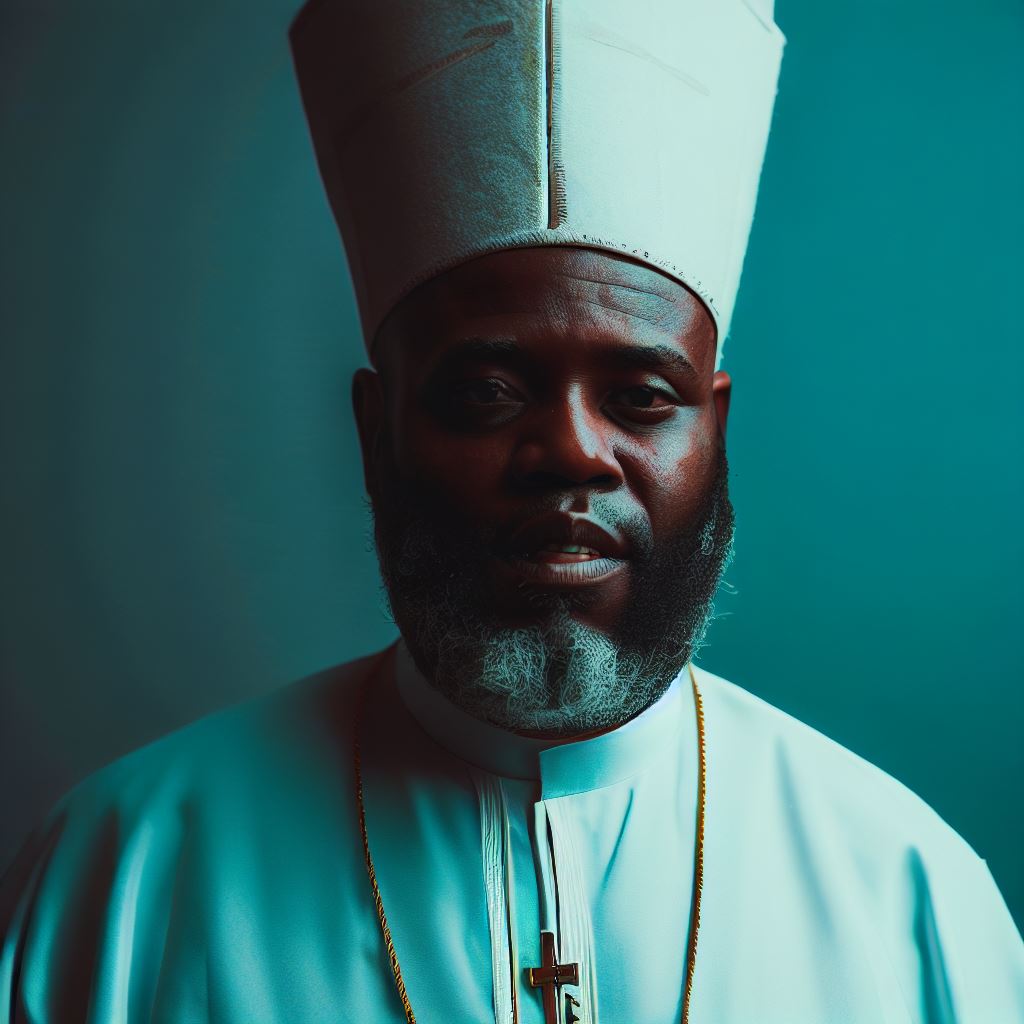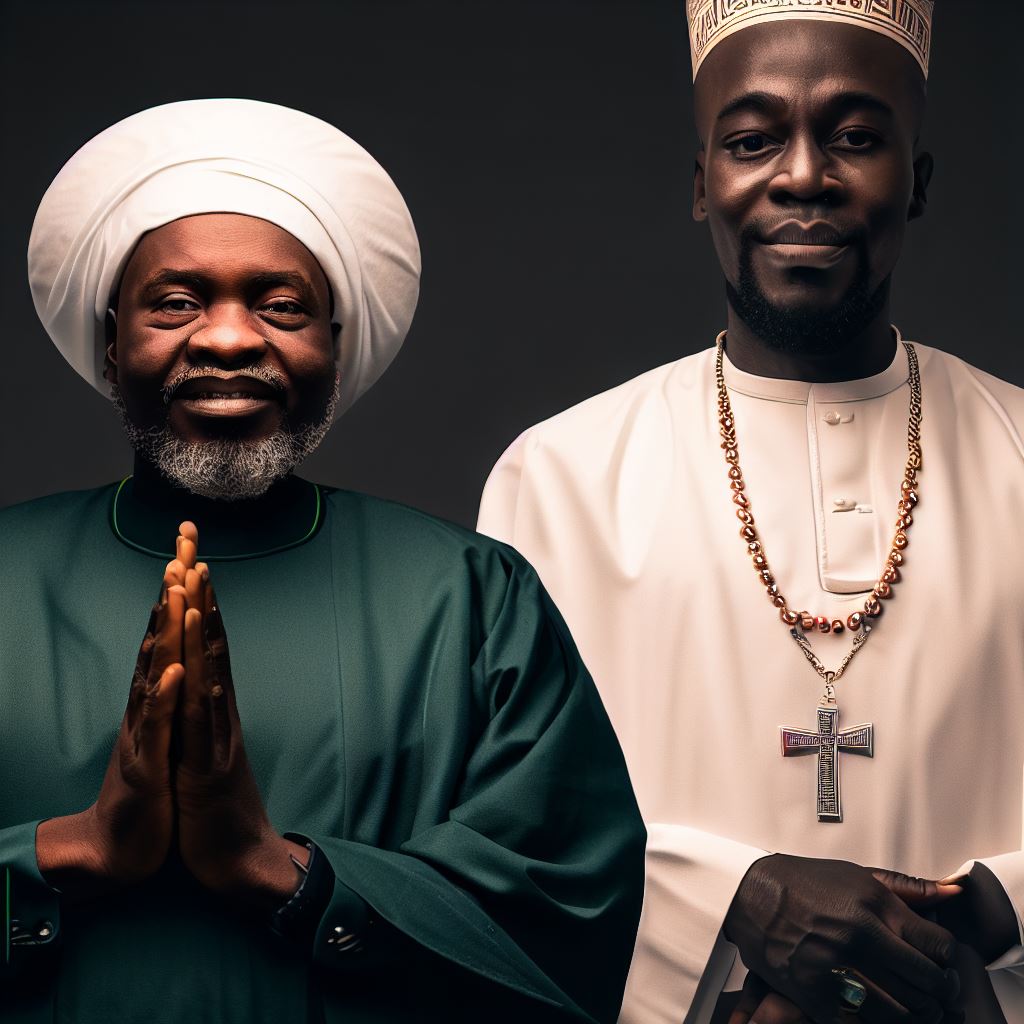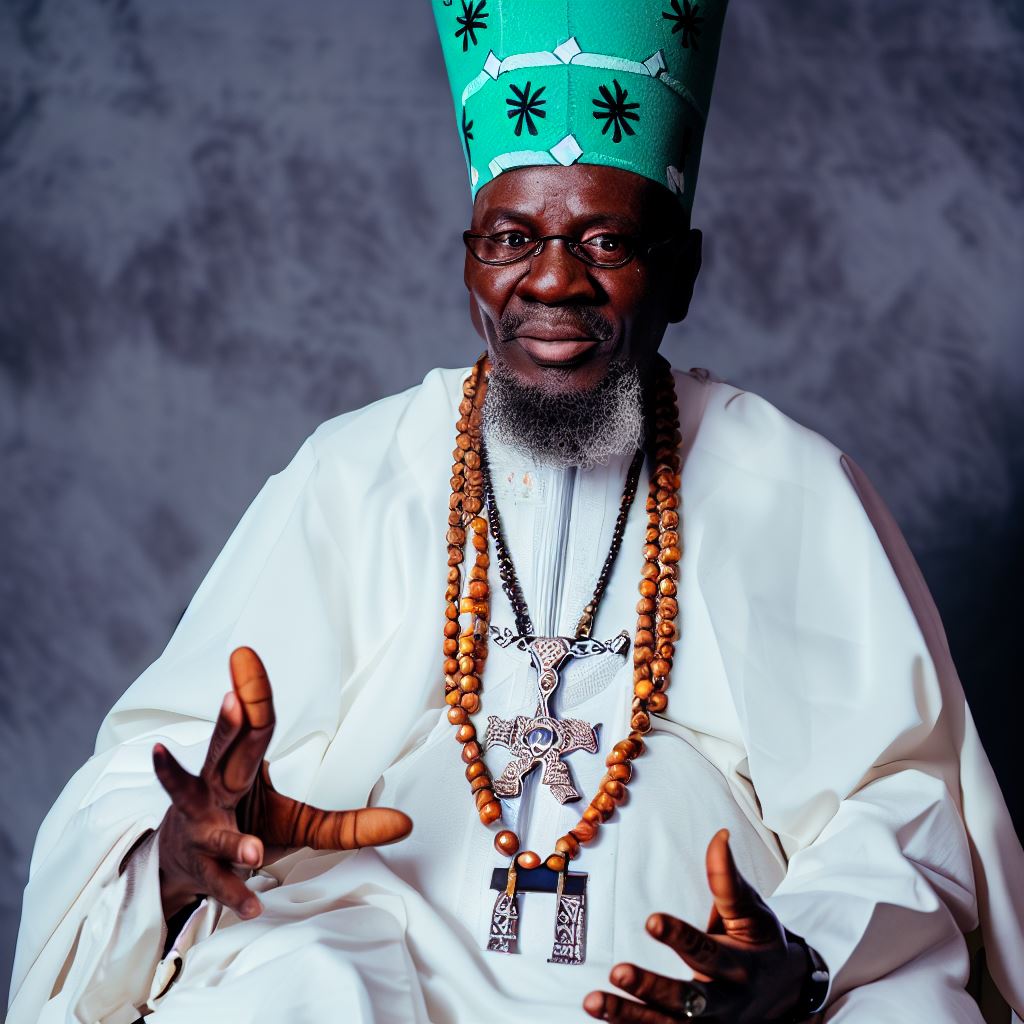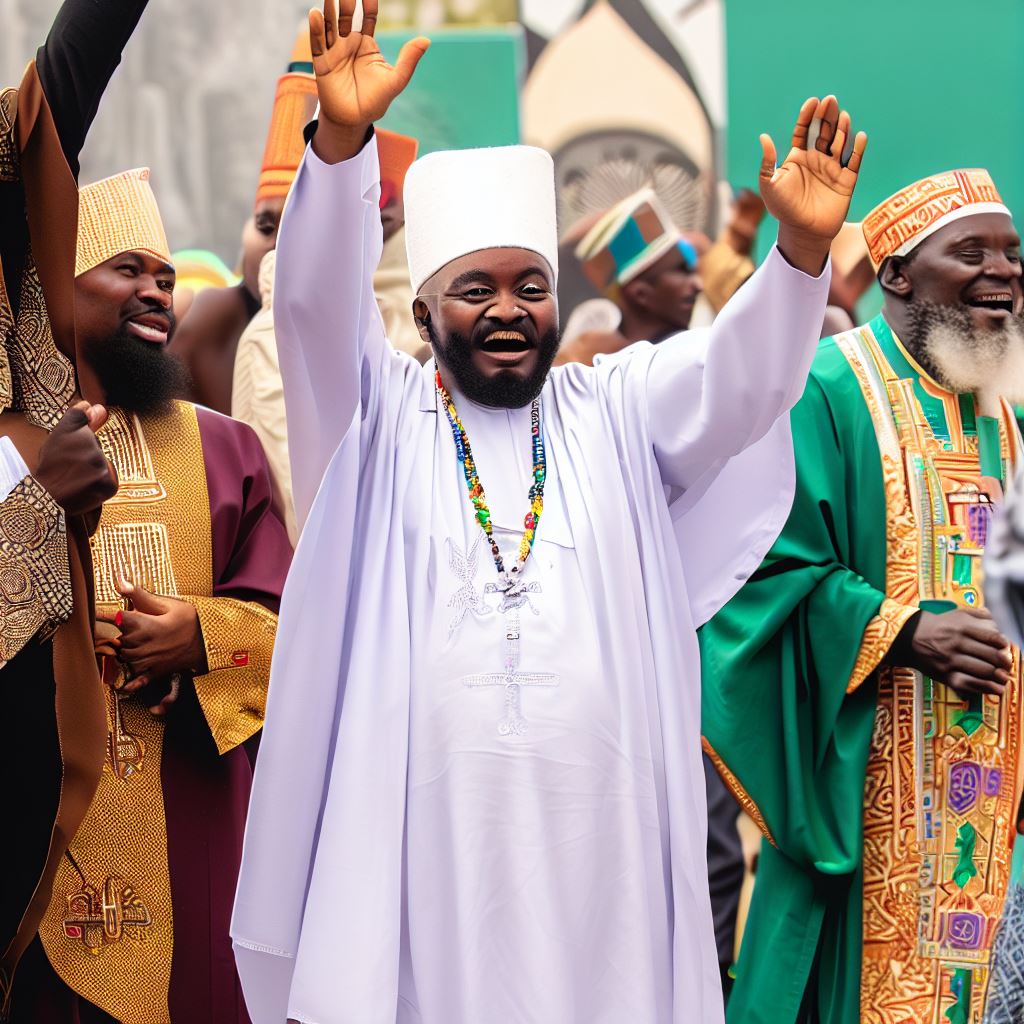Introduction
Interfaith Dialogue in Nigeria Clergy refers to conversations and discussions between individuals of different religious backgrounds.
Nigeria’s clergy comprises religious leaders who are responsible for guiding and leading their respective religious communities.
Nigeria is known for its religious diversity, with Christianity and Islam being the dominant religions.
Interfaith dialogue plays a crucial role in promoting understanding and harmony among different religious groups.
This growth in interfaith dialogue is especially significant in Nigeria due to its history of religious conflicts.
Religious leaders in Nigeria recognize the importance of dialogue in fostering peace and coexistence.
Through interfaith dialogue, the clergy in Nigeria aim to address religious tensions and promote tolerance.
Interfaith dialogue initiatives in Nigeria foster meaningful conversations, promote mutual understanding of beliefs and practices, and discover common ground.
The growth of interfaith dialogue in Nigeria’s clergy reflects a shift towards inclusivity and acceptance.
Nigeria’s clergy actively strive to bridge gaps and promote unity among the country’s diverse religious groups through interfaith dialogue.
Through their leadership, the clergy in Nigeria strive to promote peaceful coexistence and religious harmony.
Interfaith dialogue serves as a platform for creating understanding, respect, and mutual cooperation among Nigeria’s diverse religious groups.
Interfaith dialogue has become increasingly prominent in Nigeria’s clergy as a means to foster religious harmony and peace.
Historical Perspective
- Nigeria has a long history of religious conflicts that have plagued the nation.
- These conflicts have primarily been between the Muslim and Christian communities.
- The roots of these conflicts can be traced back to the colonial era when British rule introduced Christianity.
- The colonization period also led to the marginalization of Muslims in certain regions.
- Consequently, tensions arose between the two religious groups, resulting in violence and animosity.
A. Early Religious Conflicts in Nigeria
- In the 1980s and 1990s, Nigeria experienced numerous religious conflicts, particularly in the northern parts of the country.
- These conflicts were fueled by religious extremists seeking to impose their beliefs and ideologies.
- The clashes resulted in the loss of many lives and the displacement of numerous individuals.
- The inability to amicably resolve these conflicts heightened social divisions and deepened religious tensions.
- It became clear that a different approach was needed to promote peace and unity among religious groups.
B. Factors Contributing to the Growth of Interfaith Dialogue
1. Government Initiatives
- The Nigerian government played a significant role in promoting interfaith dialogue.
- It recognized that religious conflicts hindered national development and stability.
- As a result, government initiatives were implemented to foster peaceful coexistence among different religious groups.
- Policies and programs were established to encourage interfaith dialogue, tolerance, and understanding.
- These initiatives aimed to address the root causes of religious conflicts and promote harmony in Nigerian society.
2. Religious Leaders’ Role in Promoting Peace and Unity
- Religious leaders, both Muslim and Christian, have been instrumental in promoting interfaith dialogue.
- They have advocated for peaceful coexistence and emphasized the shared values between religions.
- Through their sermons and teachings, they have discouraged hate speech and religious prejudice.
- Interreligious conferences and seminars have been organized by religious leaders to foster dialogue.
- These efforts have helped to bridge the gap between religious communities and promote mutual understanding.
Interfaith dialogue in Nigeria’s clergy has grown significantly due to various factors.
Government initiatives, along with the active involvement of religious leaders, fostered peace and unity, contributing to growth.
People can foster harmonious coexistence among Nigeria’s religious groups through ongoing dialogue and understanding, despite past conflicts.
Read: Challenges Faced by Nigeria’s Clergy: An Insightful Look
Importance of Interfaith Dialogue in Nigeria’s Clergy
Interfaith dialogue plays a crucial role in Nigeria’s clergy as it promotes understanding and tolerance among different religious groups.
It encourages peaceful coexistence and fosters national unity. Additionally, interfaith dialogue is an effective means to combat religious extremism and violence.
Here are several reasons why interfaith dialogue is of utmost importance in Nigeria’s clergy:
1. Promotes Understanding and Tolerance
Interfaith dialogue promotes meaningful conversations among followers of diverse religions, deepening their understanding of beliefs and practices.
It allows individuals to learn about different faiths, reducing misconceptions and stereotypes.
2. Encourages Peaceful Coexistence
By creating a space for dialogue, Nigeria’s clergy can facilitate peaceful coexistence between different religious groups.
It helps build bridges of understanding, fostering a sense of community, and encouraging respect for diversity.
Through dialogue, conflicts can be resolved peacefully, promoting harmony within society.
3. Fosters National Unity
A unified nation is built on the foundation of mutual respect and understanding.
Nigeria’s clergy promotes national unity by urging people from various religions to collaborate for community and country development.
4. Combats Religious Extremism and Violence
One of the most pressing challenges Nigeria’s clergy face is the rise of religious extremism and violence.
Interfaith dialogue defends against threats through open discussions that debunk extremism and promote moderate religious interpretations.
5. Enhances Social Cohesion
Interfaith dialogue strengthens social cohesion within Nigerian society.
By emphasizing shared values and common goals, it brings people from different religious backgrounds together, fostering a sense of belonging and inclusivity.
This cohesion helps to build a more peaceful and stable nation.
6. Encourages Collaborative Efforts
Through interfaith dialogue, the clergy can encourage collaborative efforts among religious groups.
By working together, they can address various social issues, such as poverty, education, and healthcare, and contribute to the overall development of the country.
7. Promotes Religious Freedom
Interfaith dialogue in Nigeria’s clergy underscores the importance of religious freedom.
It emphasizes the need for individuals to have the right to practice their faith without fear of persecution or discrimination.
This freedom allows for the flourishing of diverse religious expressions and fosters a culture of acceptance.
8. Enhances Personal Growth
Engaging in interfaith dialogue allows clergy members to broaden their perspectives and deepen their knowledge of different religious traditions.
This personal growth enables them to become more effective spiritual leaders, capable of guiding their congregations with a greater level of empathy and wisdom.
9. Cultivates a Culture of Dialogue
Interfaith dialogue in Nigeria’s clergy helps to establish a culture of dialogue and understanding that seeps into broader society.
It sets an example for others to follow, encouraging individuals from all walks of life to engage in respectful conversations, even beyond religious spheres.
10. Strengthens Democracy
A thriving democracy requires the active participation of all citizens irrespective of their religious affiliations.
Interfaith dialogue within Nigeria’s clergy empowers individuals to engage critically in political processes, contributing to the maturation and stability of the country’s democratic institutions.
Interfaith dialogue is indispensable in Nigeria’s clergy as it promotes understanding, tolerance, and peaceful coexistence among different religious groups.
It serves as an effective tool to combat religious extremism and violence, fosters national unity, and enhances social cohesion.
Through dialogue, Nigeria’s clergy can contribute to the growth and well-being of the nation, creating a harmonious and inclusive society.
Read: The Economic Impact of the Clergy Profession in Nigeria
Challenges Faced in Implementing Interfaith Dialogue
Interfaith dialogue in Nigeria’s clergy has seen significant growth in recent years.
However, this growth does not come without its fair share of challenges.
1. Deep-rooted religious beliefs and biases
Deep-seated religious beliefs and biases in Nigeria impede interfaith dialogue by creating barriers to open, productive conversations.
To overcome this, we must cultivate tolerance and respect for diverse beliefs.
2. Political interference and manipulation
Political interference and manipulation pose a significant hurdle in interfaith dialogue; they exploit religious differences for personal gain, fostering mistrust.
To conquer this, we must isolate politics from religion, enabling interference-free dialogue.
3. Lack of proper infrastructure and resources for dialogue
Nigeria’s clergy face obstacles due to insufficient infrastructure and resources for interfaith dialogue, hindering effectiveness.
Solutions include investing in training, establishing communication platforms, and providing resources.
4. Lack of trust and historical conflicts
Successful interfaith dialogue relies on actively building trust, especially in Nigeria, marred by religious conflicts that breed deep mistrust.
To overcome this, we must sincerely promote forgiveness, reconciliation, and healing from past conflicts through dialogue and collaborative initiatives among religious communities.
5. Socioeconomic inequalities and poverty
Socioeconomic disparities, like poverty and limited opportunities, fuel interreligious tensions, hindering dialogue.
They foster extremism and violence, but tackling them through inclusive development and poverty alleviation indirectly aids interfaith dialogue.
6. Linguistic and cultural barriers
Nigeria’s diversity encompasses numerous ethnic groups and languages, posing communication obstacles in interfaith dialogues.
To surmount this, offer translation services and employ culturally attuned facilitators for effective dialogue among religious communities.
7. Resistance from conservative religious leaders
Conservative religious leaders resist interfaith dialogue initiatives due to identity fears and authority concerns.
Overcoming this involves engaging influential leaders, demonstrating dialogue’s benefits for peaceful coexistence.
8. External influences and international tensions
International conflicts and tensions can impact Nigeria’s interfaith dialogue, complicating initiatives due to the global rise of religious extremism.
Nonetheless, local adaptation is key for clergy to navigate these influences.
While the growth of interfaith dialogue in Nigeria’s clergy is commendable, there are still significant challenges that need to be addressed.
Read: Balancing Tradition and Modernity in Nigeria’s Clergy
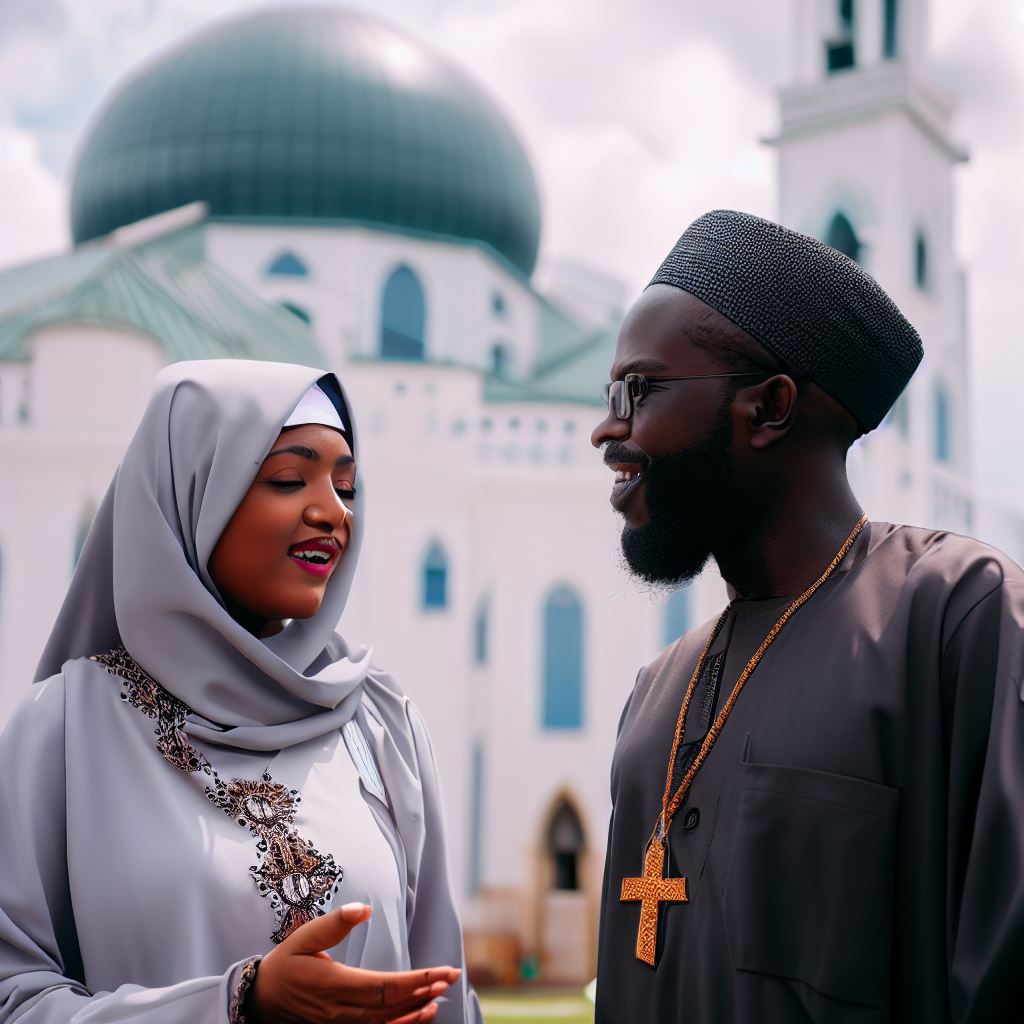
Success Stories and Initiatives
Interfaith dialogue in Nigeria has witnessed tremendous growth in recent years, contributing to the promotion of peace and religious tolerance in the country.
Success stories and initiatives emerging from various interfaith organizations and networks showcase the significant impact of such dialogues on social and political spheres.
This blog section highlights the transformative power of interfaith dialogue in Nigeria.
- The Nigerian Inter-Religious Council (NIREC) stands as a successful example of interfaith collaboration, bringing together Christian and Muslim leaders to foster unity and religious harmony across the nation.
- NIREC has facilitated regular meetings and discussions between religious leaders, resulting in joint statements condemning violence and advocating for peaceful coexistence.
- Another prominent initiative is the Interfaith Mediation Centre (IMC), which has successfully mediated conflicts between various religious communities, restoring peaceful relations.
- IMC engages religious leaders in mediation training, equipping them with conflict resolution skills that can be implemented in their respective communities.
A. Interfaith Organizations and Networks in Nigeria
- The Interfaith Dialogue Forum for Peace (IDFP) is a network that connects religious leaders, scholars, and civil society actors committed to promoting interfaith dialogue and understanding.
- The IDFP organizes conferences, seminars, and workshops where participants can exchange ideas, discuss challenges, and develop strategies to address religious conflicts.
- The Forum for Promoting Peace in Muslim Societies (FPPMS) is another organization that focuses on promoting interfaith dialogue, peace, and tolerance within Islamic communities.
- These organizations facilitate interactions between different religious groups, creating platforms for mutual understanding and promoting religious diversity.
B. Examples of Successful Interfaith Dialogue Events
- The National Youth Peace Summit, organized annually by NIREC and other interfaith organizations, brings together young people from diverse religious backgrounds for interfaith dialogues and peacebuilding activities.
- The Abuja Interfaith Conference provides a platform for religious leaders, policymakers, and scholars to engage in critical discussions on religious tolerance, cooperation, and the role of religion in national development.
- The Kaduna Interfaith Harmony Seminar, initiated by the IMC, has successfully brought together Christian and Muslim leaders to discuss and address issues affecting religious harmony in the region.
- These events foster genuine dialogue, allowing participants to challenge stereotypes, build trust, and promote peace within their communities.
C. Impact of Interfaith Dialogue on Social and Political Spheres
- Interfaith dialogue has contributed to reducing violence and conflicts fueled by religious differences, promoting communal peace and stability.
- It has helped bridge divides between religious communities, fostering a sense of unity and acceptance among diverse groups.
- Socially, interfaith dialogue initiatives have empowered women and youth, providing them with platforms to have a voice in religious and community matters.
- Politically, interfaith dialogue has influenced policymaking, leading to the creation of laws and regulations that protect religious freedom and promote peaceful coexistence.
- Interfaith dialogue initiatives have also counteracted extremist ideologies, promoting a more moderate and inclusive understanding of religious principles.
Overall, the growth of interfaith dialogue in Nigeria’s clergy has resulted in numerous success stories, initiatives, and events that have positively impacted society.
Through collaboration, understanding, and cooperation, Nigeria’s religious leaders have played a critical role in promoting peace, tolerance, and mutual respect among different faith communities.
Read: Nigerian Clergy’s Role in Education and Community Care
Find Out More: Women in Nigeria’s Clergy: Roles and Responsibilities
Personal Experiences and Testimonials
In recent years, Nigeria has witnessed a significant growth in interfaith dialogue among its clergy.
This positive development has been fueled by personal experiences, testimonials, interviews with religious leaders involved in such efforts, and stories of individuals impacted by interfaith dialogue initiatives.
Many clergy in Nigeria have personally experienced the transformative power of interfaith dialogue.
For instance, Reverend Samuel Atiku, a Christian pastor, recalls an encounter that changed his perspective forever.
During a gathering of religious leaders from different faiths, Reverend Atiku engaged in a deep conversation with Imam Hassan, a Muslim religious leader.
This dialogue allowed them to find common ground and dispel misconceptions they held about each other’s faiths.
Reverend Atiku shares, “Through interfaith dialogue, we realized that our religions share similar teachings of love, peace, and compassion. It was a profound moment of unity and understanding.”
Similarly, Islamic scholar Sheikh Umar Ahmad narrates his personal journey towards participating in interfaith dialogue initiatives.
Growing up in a strictly conservative religious community, he was initially skeptical about engaging with members of other faiths.
However, after attending an interfaith conference, Sheikh Umar had a change of heart.
He witnessed the openness, respect, and the willingness to learn from one another displayed by participants from different religions.
He shares, “Interfaith dialogue exposed me to the richness and diversity of religious beliefs. It helped me overcome prejudices and deepen my understanding of other faiths.”
A. Interviews with Religious Leaders Involved in Interfaith Dialogue Efforts
To gain deeper insights into the growth of interfaith dialogue in Nigeria’s clergy, interviews were conducted with key religious leaders actively engaged in these efforts.
Pastor Esther Okafor, a prominent Christian leader, highlights the significance of interfaith dialogue in promoting peaceful coexistence.
She emphasizes the need for continuous communication and collaboration between different religious communities.
Publish Your Professional Profile, Business or Brand
Showcase your expertise, gain trust, and boost visibility instantly on Professions.ng.
Publish NowShe notes, “Interfaith dialogue fosters tolerance, reduces conflicts, and promotes harmonious interactions among religious factions.
As clergy, it is our responsibility to lead by example and encourage dialogue for the betterment of society.”
Imam Ahmed Mohammed, a renowned Muslim cleric, stresses the impact of interfaith dialogue on addressing religious stereotypes and building trust.
He believes that such dialogue should be driven by a genuine desire to understand one another.
Imam Mohammed states, “By engaging in interfaith dialogue, we realize that our differences can be celebrated rather than feared.
It enables us to dispel misconceptions and create a shared vision of a peaceful and inclusive Nigeria.”
B. Stories of Individuals Impacted by Interfaith Dialogue Initiatives
The growth of interfaith dialogue in Nigeria’s clergy is also evident in the stories of individuals whose lives have been positively impacted by these initiatives.
Adaeze Okonkwo, a young Christian woman, found herself at a crossroads when she fell in love with Ibrahim, a Muslim man.
Initially, their families were skeptical and wary of their relationship due to religious differences.
However, through interfaith dialogue sessions facilitated by religious leaders, both families began to soften their stance.
They realized that love, respect, and understanding could transcend religious boundaries.
Adaeze shares, “Interfaith dialogue not only saved our relationship, but it also brought our families together, fostering acceptance and harmony.
Similarly, Adamu Bello, a Muslim man, encountered a life-changing experience through interfaith dialogue.
He was imprisoned for a crime he did not commit, and in jail, he met Pastor James, a Christian chaplain.
Through their conversations and shared prayers, Adamu developed a newfound faith, embracing the teachings of love, forgiveness, and reconciliation found in Christianity.
Upon his release, he became an advocate for interfaith dialogue.
Adamu reflects, “Interfaith dialogue showed me that religion should not be a source of division or conflict. Instead, it should be a unifying force that brings us closer to understanding one another.”
The growth of interfaith dialogue in Nigeria’s clergy is a testament to the transformative power of open and respectful conversations among religious leaders and individuals.
Through personal experiences, testimonials, interviews with religious leaders, and stories of impact, the importance of interfaith dialogue in fostering unity, tolerance, and peace becomes evident.
As Nigeria continues to build bridges between different religious factions, interfaith dialogue offers a promising path forward towards a more harmonious and inclusive society.
Lessons Learned and Future Prospects
Interfaith dialogue has played a crucial role in fostering peace and harmony within Nigeria’s clergy, and there are several key takeaways from this experience.
These lessons can be instrumental in further strengthening and expanding interfaith dialogue not only in Nigeria but also in other countries and regions facing religious tensions.
A. Key Takeaways from Nigeria’s Experience with Interfaith Dialogue
- Embracing respect and understanding: The clergy learned the importance of respecting and understanding each other’s faiths, which created a conducive environment for dialogue.
- Breaking down stereotypes: Through dialogue and interaction, long-held stereotypes and prejudices were challenged and dismantled, fostering reconciliation.
- Building trust: Interfaith dialogue helped build trust among religious leaders, leading to increased collaboration and joint initiatives for the betterment of society.
- Addressing common challenges: Engaging in dialogue enabled the clergy to recognize shared challenges and work together towards finding solutions.
- Empowering youth: Recognizing the potential of the youth, interfaith dialogue emphasized their inclusion and involvement in peacebuilding actions.
- Continued learning and adaptation: The experience highlighted the importance of continuous learning and adapting dialogue methods to effectively address evolving dynamics.
B. Strategies to Further Strengthen and Expand Interfaith Dialogue in the Clergy
To ensure the continuous growth and effectiveness of interfaith dialogue among the clergy in Nigeria and beyond, the following strategies can be implemented:
- Encouraging interfaith education: Promote educational programs that foster a deeper understanding of different religious traditions and encourage dialogue.
- Creating safe spaces: Establish dedicated platforms for open and honest dialogue, enabling clergy members to express their perspectives freely.
- Nurturing grassroots movements: Support and empower local interfaith initiatives that involve community leaders and encourage grassroots participation.
- Engaging women in dialogue: Recognize and involve women as catalysts of change in interfaith dialogue, promoting their active participation and leadership roles.
- Facilitating interfaith collaborations: Encourage joint projects and initiatives that promote social and economic development, fostering trust and cooperation.
- Utilizing technology: Harness the power of technology, such as social media and online platforms, to create virtual dialogue spaces and reach wider audiences.
C. Potential Benefits for Other Countries and Regions
Nigeria’s experience with interfaith dialogue in the clergy provides valuable insights and potential benefits that can inspire and guide other countries and regions facing religious tensions:
- Promoting peace and stability: Interfaith dialogue can be a powerful tool to mitigate conflicts and promote peaceful coexistence between different religious communities.
- Fostering understanding and tolerance: Through dialogue, individuals develop a deeper understanding of diverse faiths, leading to increased tolerance and acceptance.
- Enhancing social cohesion: Interfaith dialogue strengthens social bonds and builds bridges between various religious groups, fostering unity and a sense of shared responsibility.
- Encouraging sustainable development: Collaborative interfaith initiatives can address common challenges and contribute to social and economic development.
- Inspiring global solidarity: Successful interfaith dialogue experiences can inspire similar initiatives worldwide, promoting a culture of peace and understanding.
Nigeria’s clergy has made significant progress in embracing interfaith dialogue, and there are valuable lessons to be learned from their experience.
By implementing effective strategies and recognizing the potential benefits, interfaith dialogue can continue to grow, strengthen, and inspire societies globally.
Conclusion
The growth of interfaith dialogue in Nigeria clergy has significant importance in fostering peace and understanding among different religious communities.
It has played a crucial role in reducing religious conflicts and promoting unity in the country.
Additionally, interfaith dialogue has helped clergy members to broaden their perspectives and deepen their knowledge of other faiths, leading to greater tolerance and respect.
Interfaith dialogue in Nigeria clergy has fostered harmony and inclusivity, highlighting its significant role in societal growth.
By engaging in dialogue, clergy members have been able to address religious misunderstandings and misconceptions that can often fuel violence and discrimination.
Therefore, it is essential for individuals to actively support and engage in interfaith dialogue efforts.
Individuals can contribute to interfaith dialogue in Nigeria’s clergy by actively engaging in discussions, attending events, and promoting harmony.
It is crucial to recognize and appreciate the diversity of religious beliefs and work towards fostering an atmosphere of acceptance and understanding.
Interfaith dialogue in Nigeria’s clergy is an effective tool for promoting peace, unity, and religious tolerance.
It is our collective responsibility to support and engage in interfaith dialogue efforts, as it paves the way for a more inclusive and harmonious society.
Let us embrace our differences and build bridges of understanding through dialogue and cooperation. Together, we can create a Nigeria where religious diversity is celebrated and conflicts are resolved peacefully.

